冀教版九年级上册Unit 1 Stay Healthy Unit1 Review 课件(共19张PPT)
文档属性
| 名称 | 冀教版九年级上册Unit 1 Stay Healthy Unit1 Review 课件(共19张PPT) |

|
|
| 格式 | ppt | ||
| 文件大小 | 841.0KB | ||
| 资源类型 | 教案 | ||
| 版本资源 | 冀教版 | ||
| 科目 | 英语 | ||
| 更新时间 | 2022-12-02 22:59:03 | ||
图片预览

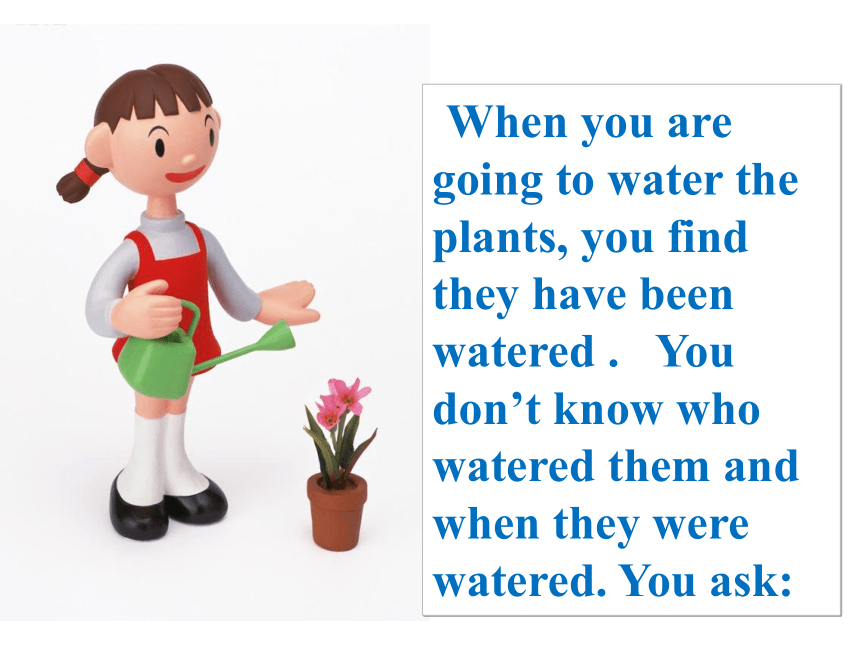
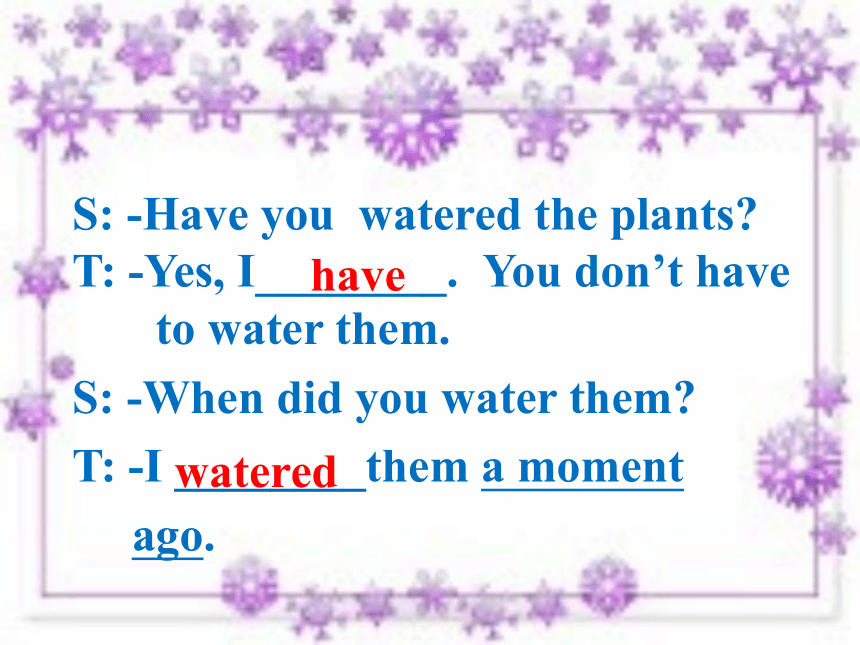
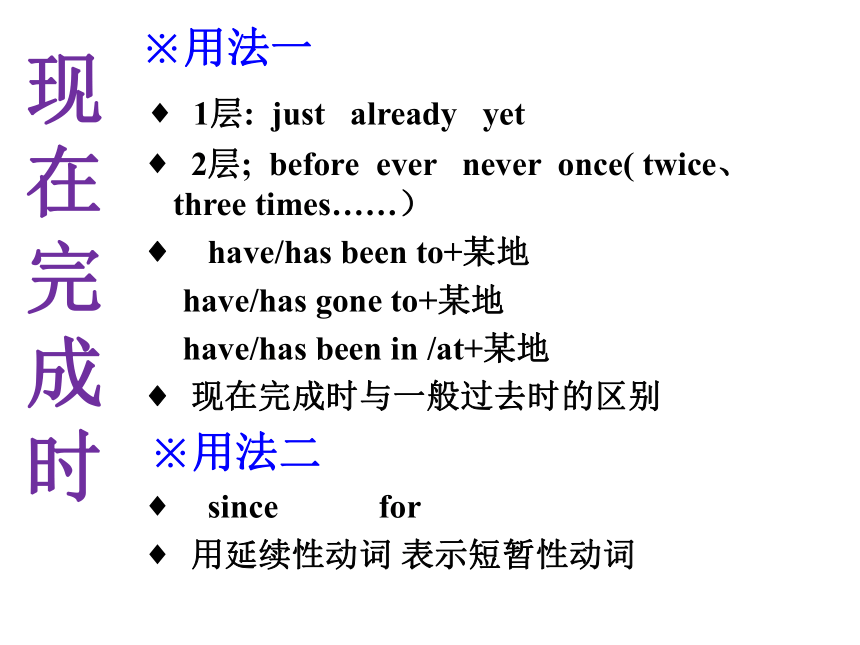
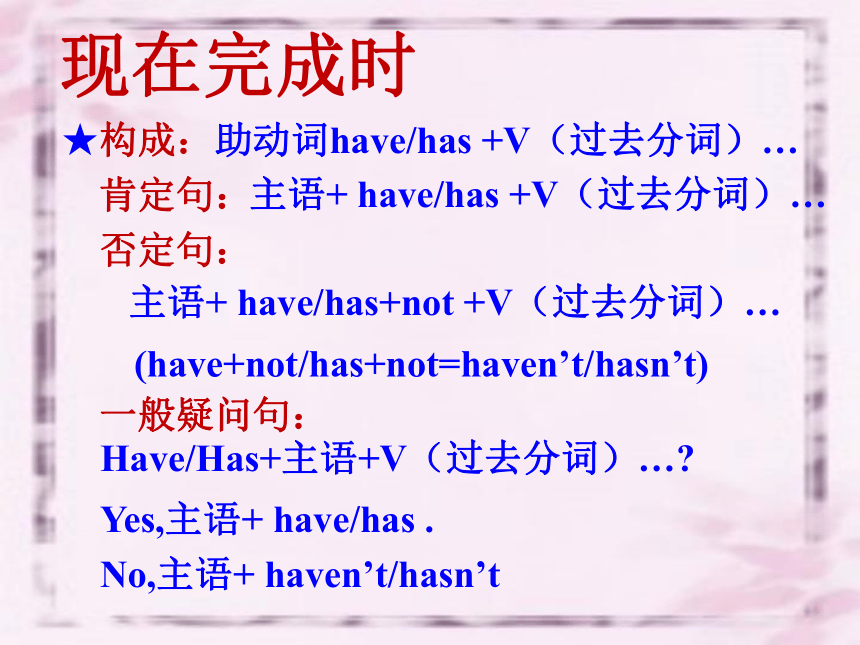
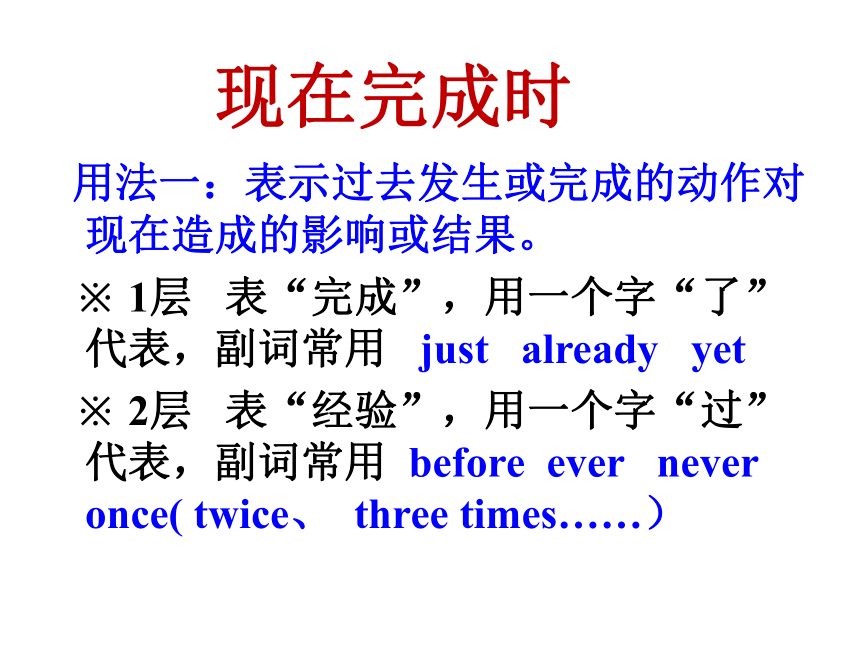
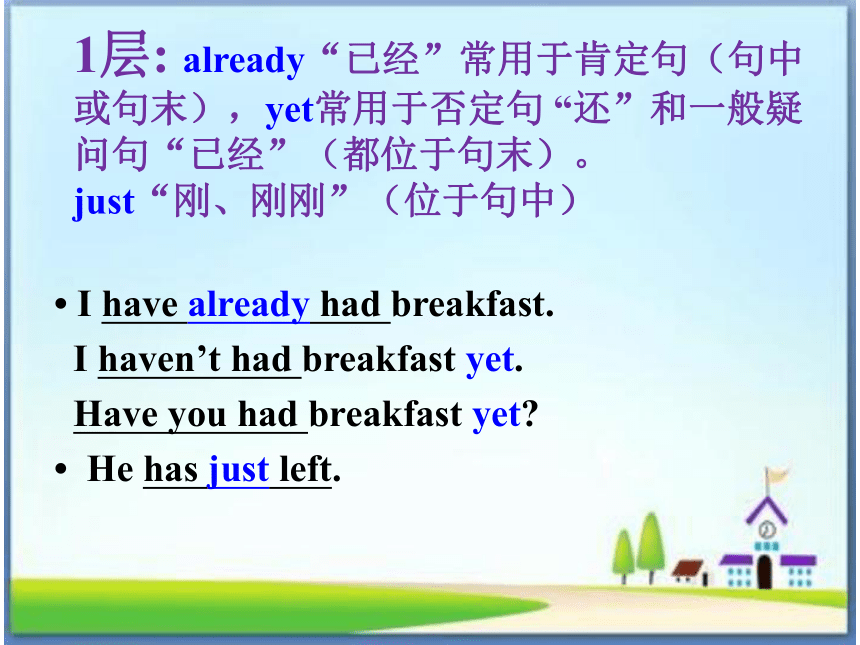
文档简介
(共19张PPT)
When you are going to water the plants, you find they have been watered . You don’t know who watered them and when they were watered. You ask:
S: -Have you watered the plants
T: -Yes, I________. You don’t have
to water them.
S: -When did you water them
T: -I ________them a moment
ago.
have
watered
现在完成时
※用法一
1层: just already yet
2层; before ever never once( twice、 three times……)
have/has been to+某地
have/has gone to+某地
have/has been in /at+某地
现在完成时与一般过去时的区别
※用法二
since for
用延续性动词 表示短暂性动词
现在完成时
★构成:助动词have/has +V(过去分词)…
肯定句:
否定句:
一般疑问句:
主语+ have/has +V(过去分词)…
主语+ have/has+not +V(过去分词)…
(have+not/has+not=haven’t/hasn’t)
Have/Has+主语+V(过去分词)…
Yes,主语+ have/has .
No,主语+ haven’t/hasn’t
现在完成时
用法一:表示过去发生或完成的动作对现在造成的影响或结果。
※ 1层 表“完成”,用一个字“了”代表,副词常用 just already yet
※ 2层 表“经验”,用一个字“过”代表,副词常用 before ever never once( twice、 three times……)
I have already had breakfast.
I haven’t had breakfast yet.
Have you had breakfast yet
He has just left.
1层: already“已经”常用于肯定句(句中或句末),yet常用于否定句 “还”和一般疑问句“已经”(都位于句末)。
just“刚、刚刚”(位于句中)
2层:before 以前 ever 曾经 never从没有 once一次( twice两次,three times三次……)
他以前从未开过车。
He has never driven a car before.
这首歌我们已经唱了两遍
We have sung the song twice.
你曾经喂过动物吗?
Have you ever fed the animals?
Practice(用already just yet never ever 填空)
1. I have _______ seen him before, so I have no idea about him.
2. Jack has _________ finished his homework.
3. I’ve _________ had some photos taken. 我刚照了几张相。
4. “Have you ________ seen the film ” “No, I
have ________ seen it.”
5. “Has the bus left _______ ”
“Yes, it has _______________ left.”
never
already
just
ever
never
yet
already/just
have/has been to+某地(去过某地)
have/has gone to+某地(去了某地)
have/has been in /at+某地+for+
一段时间(在某地待了多长时间)
She has been abroad twice.
---Where is she ---She has gone to Europe.
He has never been to Shanghai .
He has gone home.
The boy has been there for 3 days.
---How long have you been in this town
---I have been here since 7 years ago.
注意
现在完成时与一般过去时的区别
现在完成时与一般过去时两个动作都发生在过去,现在完成时指过去的动作对现在的影响,不强调时间;而一般过去时强调过去时间发生的动作。
【根本的区别就是:过去的时间状语不能用于现在完成时,包括疑问词when。】
改错:
I have fed the dog just now. ( )( )
When have you seen this film
( ) ( )
have fed
fed
have you seen
did you see
现在完成时
用法二:表示动作发生在过去,并且一直持续到现在,有可能继续。常与一段的时间连用。(由介词for和since表示,其他的副词有recently近来, in the past/last few years在过去的几年里,so far到目前为止)
For+一段时间(for two years, for a long time)
+ 过去的时间(last year, two
since years ago, 2015,yesterday……)
+时间状语从句(一般过去时态)
It +is/has been+一段时间+since的用法
1.______two years 2.________two years ago
3._______last month 4.______ 1999
5._______yesterday 6._______ 4 o’clock
7.______an hour
8. I’ve known him ______ we were children.
9. Our teacher has studied Japanese ______
three years.
10. It’s about ten years __________ she left
the city.
用for或since填空
for
since
since
since
since
since
for
since
for
since
当堂训练
短暂性动词和延续性动词
延续性动词:teach, live, stay, have, stand, play, sleep, write…
短暂性动词: go, come, arrive, leave, begin, start, get up, open, close, die, marry, borrow, buy, join…
★短暂性动词不能和表示一段的时间状语连用。包括疑问词how long
用表示延续的动词代替短暂性动词
go/come/arrive--be in/at(去/来/到达);
leave--be away(from)(离开);
begin/start—be on(开始); get up—be up(起床); open—be open(打开);
close—be closed(关); die—be dead(死);
marry—be married(结婚);
borrow—keep(借阅); buy—have(买);
join—be in+团体/be a…member(参加)
1.The old man _________ last year. He has
_____ ______for a year. (die) (动词填空)
2. Miss Gao left an hour ago. (同义句转换) →Miss Gao has _______ ________ ________
an hour ago.
3. My brother joined the Army three years ago. →My brother ______ ______ ______the Army _____ three years ago.
→ My brother ______ ______ a solider ______ three years.
4.这本书我可以借阅多长时间?
____ _____have I _____ the book
died
been dead
been away since
has been in
since
has been
for
How long
kept
当堂训练
直击中考
1.What a nice watch! How long ____you____it
--For just two weeks.
A. will; buy B. have;had C. were; having D. did;buy
2. I _____the History Museum twice. I’ve learned a lot there.
A. visit B. am visiting C. have visited D. Will visit
3. He______the city since he graduated from college.
A. has left B. left C. has been away from D. leaves
4. My mother ______a good example for me since I was young.
A. was B. has been C. will be D. is
5.This medicine ______ million of people’s lives since it was put into use.
A.is saving B. will save C. had saved D. has saved
B
D
C
C
B
※用法一
1层: just already yet
2层; before ever never once( twice、 three times……)
have/has been to+某地
have/has gone to+某地
have/has been in /at+某地
现在完成时与一般过去时的区别
※用法二
since for
用延续性动词 表示短暂性动词
When you are going to water the plants, you find they have been watered . You don’t know who watered them and when they were watered. You ask:
S: -Have you watered the plants
T: -Yes, I________. You don’t have
to water them.
S: -When did you water them
T: -I ________them a moment
ago.
have
watered
现在完成时
※用法一
1层: just already yet
2层; before ever never once( twice、 three times……)
have/has been to+某地
have/has gone to+某地
have/has been in /at+某地
现在完成时与一般过去时的区别
※用法二
since for
用延续性动词 表示短暂性动词
现在完成时
★构成:助动词have/has +V(过去分词)…
肯定句:
否定句:
一般疑问句:
主语+ have/has +V(过去分词)…
主语+ have/has+not +V(过去分词)…
(have+not/has+not=haven’t/hasn’t)
Have/Has+主语+V(过去分词)…
Yes,主语+ have/has .
No,主语+ haven’t/hasn’t
现在完成时
用法一:表示过去发生或完成的动作对现在造成的影响或结果。
※ 1层 表“完成”,用一个字“了”代表,副词常用 just already yet
※ 2层 表“经验”,用一个字“过”代表,副词常用 before ever never once( twice、 three times……)
I have already had breakfast.
I haven’t had breakfast yet.
Have you had breakfast yet
He has just left.
1层: already“已经”常用于肯定句(句中或句末),yet常用于否定句 “还”和一般疑问句“已经”(都位于句末)。
just“刚、刚刚”(位于句中)
2层:before 以前 ever 曾经 never从没有 once一次( twice两次,three times三次……)
他以前从未开过车。
He has never driven a car before.
这首歌我们已经唱了两遍
We have sung the song twice.
你曾经喂过动物吗?
Have you ever fed the animals?
Practice(用already just yet never ever 填空)
1. I have _______ seen him before, so I have no idea about him.
2. Jack has _________ finished his homework.
3. I’ve _________ had some photos taken. 我刚照了几张相。
4. “Have you ________ seen the film ” “No, I
have ________ seen it.”
5. “Has the bus left _______ ”
“Yes, it has _______________ left.”
never
already
just
ever
never
yet
already/just
have/has been to+某地(去过某地)
have/has gone to+某地(去了某地)
have/has been in /at+某地+for+
一段时间(在某地待了多长时间)
She has been abroad twice.
---Where is she ---She has gone to Europe.
He has never been to Shanghai .
He has gone home.
The boy has been there for 3 days.
---How long have you been in this town
---I have been here since 7 years ago.
注意
现在完成时与一般过去时的区别
现在完成时与一般过去时两个动作都发生在过去,现在完成时指过去的动作对现在的影响,不强调时间;而一般过去时强调过去时间发生的动作。
【根本的区别就是:过去的时间状语不能用于现在完成时,包括疑问词when。】
改错:
I have fed the dog just now. ( )( )
When have you seen this film
( ) ( )
have fed
fed
have you seen
did you see
现在完成时
用法二:表示动作发生在过去,并且一直持续到现在,有可能继续。常与一段的时间连用。(由介词for和since表示,其他的副词有recently近来, in the past/last few years在过去的几年里,so far到目前为止)
For+一段时间(for two years, for a long time)
+ 过去的时间(last year, two
since years ago, 2015,yesterday……)
+时间状语从句(一般过去时态)
It +is/has been+一段时间+since的用法
1.______two years 2.________two years ago
3._______last month 4.______ 1999
5._______yesterday 6._______ 4 o’clock
7.______an hour
8. I’ve known him ______ we were children.
9. Our teacher has studied Japanese ______
three years.
10. It’s about ten years __________ she left
the city.
用for或since填空
for
since
since
since
since
since
for
since
for
since
当堂训练
短暂性动词和延续性动词
延续性动词:teach, live, stay, have, stand, play, sleep, write…
短暂性动词: go, come, arrive, leave, begin, start, get up, open, close, die, marry, borrow, buy, join…
★短暂性动词不能和表示一段的时间状语连用。包括疑问词how long
用表示延续的动词代替短暂性动词
go/come/arrive--be in/at(去/来/到达);
leave--be away(from)(离开);
begin/start—be on(开始); get up—be up(起床); open—be open(打开);
close—be closed(关); die—be dead(死);
marry—be married(结婚);
borrow—keep(借阅); buy—have(买);
join—be in+团体/be a…member(参加)
1.The old man _________ last year. He has
_____ ______for a year. (die) (动词填空)
2. Miss Gao left an hour ago. (同义句转换) →Miss Gao has _______ ________ ________
an hour ago.
3. My brother joined the Army three years ago. →My brother ______ ______ ______the Army _____ three years ago.
→ My brother ______ ______ a solider ______ three years.
4.这本书我可以借阅多长时间?
____ _____have I _____ the book
died
been dead
been away since
has been in
since
has been
for
How long
kept
当堂训练
直击中考
1.What a nice watch! How long ____you____it
--For just two weeks.
A. will; buy B. have;had C. were; having D. did;buy
2. I _____the History Museum twice. I’ve learned a lot there.
A. visit B. am visiting C. have visited D. Will visit
3. He______the city since he graduated from college.
A. has left B. left C. has been away from D. leaves
4. My mother ______a good example for me since I was young.
A. was B. has been C. will be D. is
5.This medicine ______ million of people’s lives since it was put into use.
A.is saving B. will save C. had saved D. has saved
B
D
C
C
B
※用法一
1层: just already yet
2层; before ever never once( twice、 three times……)
have/has been to+某地
have/has gone to+某地
have/has been in /at+某地
现在完成时与一般过去时的区别
※用法二
since for
用延续性动词 表示短暂性动词
同课章节目录
- Unit 1 Stay Healthy
- Lesson 1 What's Wrong,Danny?
- Lesson 2 A Visit to the Dentist
- Lesson 3 Good Food, Good Health
- Lesson 4 Don't Smoke, Please!
- Lesson 5 Jane's Lucky Life
- Lesson 6 Stay Away from the Hospital
- Unit Review
- Unit 2 Great People
- Lesson 7 What Is the Meaning of Lift?
- Lesson 8 A Universe of Thought
- Lesson 9 China's Most Famous "Farmer"
- Lesson 10 Touch the World
- Lesson 11 To China, with Love
- Lesson 12 Guess My Hero!
- Unit Review
- Unit 3 Safety
- Lesson 13 Be Careful,Danny!
- Lesson 14 Accidents Happen
- Lesson 15 My Helmet Saved My Life!
- Lesson 16 How Safe Is Your Home?
- Lesson 17 Staying Safe in an Earthquake
- Lesson 18 Never Catch a Dinosaur
- Unit Review
- Unit 4 Stories and poems
- Lesson 19 A Story or a Poem?
- Lesson 20 Say It in Five
- Lesson 21 The Fable of the Woodcutte
- Lesson 22 The Giant(Ⅰ)
- Lesson 23 The Giant(Ⅱ)
- Lesson 24 Writing a Poem
- Unit Review
- Unit 5 Look into Science
- Lesson 25 Let's Do an Experiment!
- Lesson 26 Keep the Candle Burning
- Lesson 27 Planet Danny
- Lesson 28 The Study of Living Things
- Lesson 29 DNA—The Story of You
- Lesson 30 Science Affects Us
- Unit Review
- Unit 6 Movies and Theate
- Lesson 31 A movie or a Play
- Lesson 32 Moving Pictures
- Lesson 33 The Fisherman and the Goldfish(Ⅰ)
- Lesson 34 The Fisherman and the Goldfish(Ⅱ)
- Lesson 35 Theatres Are Fun!
- Lesson 36 Making Plays Is Fun
- Unit Review
